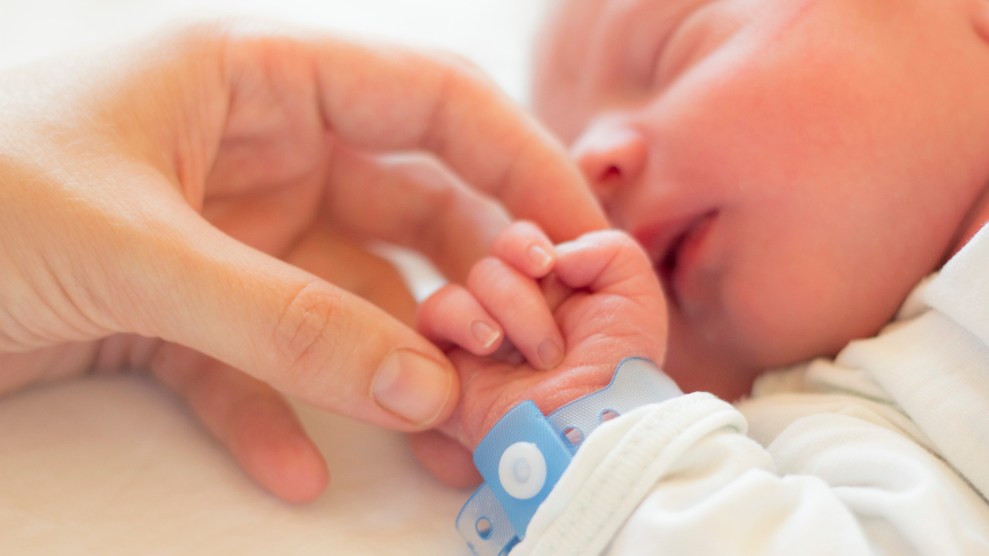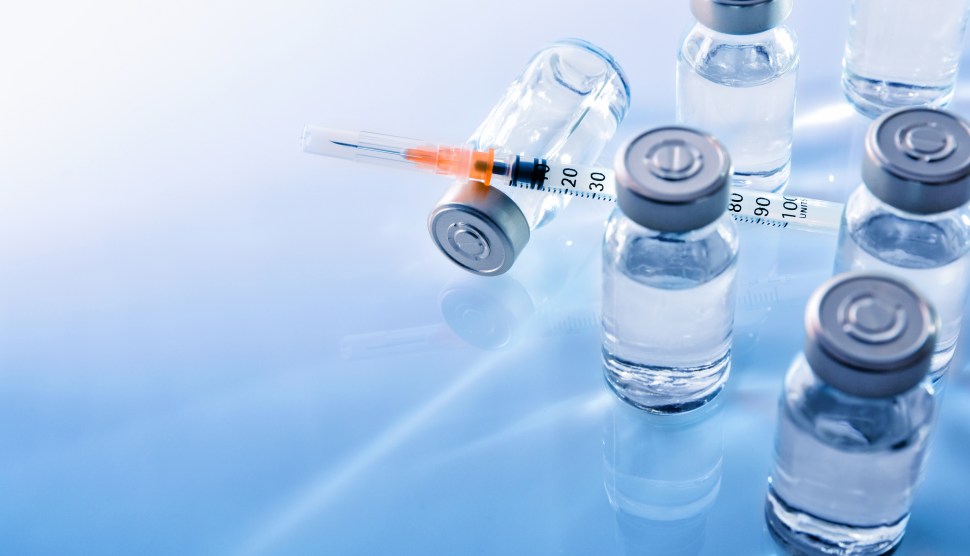
Newborn baby boy sleeping in his crib, his mother's hand holding his little handmmpile/Getty
Since 1961, it’s been standard practice for American newborns to receive an injection of vitamin K, a supplement that helps blood clot and prevents brain bleeds. But a new study documents a national trend of parents refusing the shot. Pediatricians are worried this could catch on—with dangerous consequences.
The study, released last month by the American Academy of Pediatrics (AAP), looked at nearly 103,000 babies born in 2015. Researchers found that 0.6 percent of babies didn’t get vitamin K injections because of their parents’ objections. That may not seem like a worrisome number, but Dr. Jaspreet Loyal, the pediatrician leading the study, notes that 4 million babies are born in the United States every year. “That’s a significant number of babies,” she said.
The vitamin K shot is not a vaccine. It doesn’t protect against a communicable disease; it just prevents babies from excessive bleeding. According to the Centers for Disease Control and Prevention, the vitamin is scarce in newborns because it doesn’t travel through the placenta very well. Without it, infants have an increased risk of brain hemorrhages, said Dr. Steven Abrams, chair of the American Academy of Pediatrics Committee on Nutrition.
“The babies who bleed into the brain are often severely neurologically impaired for life,” Abrams said.
The risks of “vitamin K deficiency bleeding,” or VKDB, are present until babies are six months old, according to the CDC, putting infants at risk for internal bleeding that can cause long-lasting harm. While very rare, VKDB is completely preventable via the injection.
On top of that, pediatricians are finding that parents are refusing vitamin K injections for their newborn children alongside vaccines—the new study notes particularly strong correlations to vaccines like the hepatitis B vaccine and ocular prophylaxis, which prevents gonorrhea.
The study reported the first estimate of vitamin K refusals across the United States, though anecdotal reports suggest that the trend started a few years ago. Around 2013, accounts started popping up of some parents refusing vitamin K injections for their newborns. That year, a report from the CDC found four newborns in Tennessee who experienced excessive bleeding due to low vitamin K caused by not receiving the injection. The following year, the Tennessean reported seven more cases. Canadian researchers noted a similar trend in Alberta in 2014, finding that 0.3 percent of children in a large study had parents who refused the injection.
In 2016, researchers in North Carolina surveyed a small number of parents forgoing vitamin K to figure out why, and reported that most were white, college-educated parents over 30—characteristics typical of those who refuse childhood vaccines. Around 70 percent of parents who responded to the survey said they got the information from the internet, and noted concerns about toxins, side effects, and the injection being “unnatural.” This new study noted similar demographics: The average refuser was a white parent just over 30 years old.
An AAP report discussing the controversies behind vitamin K noted that a potential reason may be concerns about cancer: A study conducted in 1992 attempted to find a correlation between vitamin K injections and childhood cancer but was debunked, as was another study in 2000. Subsequent studies further weakened that theory. The report and the 2016 survey also noted that mothers who plan on exclusively breastfeeding are more likely to opt out, suggesting that they think their child would receive enough vitamin K through diet.
But breast milk alone can’t supply all the vitamin K that a baby needs. According to Abrams, oral alternatives aren’t as effective either.
While this new study covers hospital births, other smaller studies suggest that people who opt for birthing centers and home births are more likely to forgo vitamin K alongside vaccines.
“This is kind of a wake-up call,” said Loyal.
Abrams emphasized the importance of communicating the necessity of vitamin K to expecting parents. “It’s kind of too late afterward to say, ‘I should have paid attention.'”













